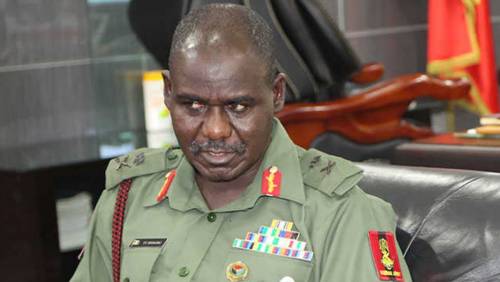
By John Madu
The Nigerian Army has been in the news of late. There have been various insinuations in certain quarters with regards to the conduct of the Nigerian Army in the prosecution of the war against terrorism and other criminal elements in the country. Aside these, there is also a perception with regards the professionalism and conduct of its personnel.
However, what some section of the country has failed to come to terms with is the fact that since the coming of the administration of President Muhammadu Buhari and the subsequent appointment of Lt. Gen. Tukur Buratai as the Chief of Army Staff, there have been lots of innovations in the Nigerian Army and mainly responsible for the successes recorded in the war against terrorism and other criminal elements across the country.
I dare say I am a die-hard fan of the Chief of Army Staff. I say this for two reasons; one is the fact that he has entrenched a regime of transparency and accountability and secondly is the fact that he has caused a revolution in infrastructural development across units and formations in the Nigerian Army.
I would start with the establishment of the Nigerian Army University in Biu, Borno State, a specialized solution centre for the military and the country – with particular attention to providing solutions to the disturbance in Nigeria’s northeast – and the first of its kind established by the Nigerian Army.
In conceptualizing the Nigerian Army University, the Chief of Army Staff stated that “the university was conceived as a unique university that would be different from conventional universities in Nigeria. The concept is to make it a solution provider and a centre of excellence for a variety of technologically related ventures, such as generation and armament production.”
This, in addition to the concentration on improving the military intellectually and technologically, and annihilating the group terrorizing North-East Nigeria from its roots, makes the Nigerian Army University ongoing development an outstanding effort on the part of the Nigerian military.
This is indeed novel and an indication of how the Nigerian Army has fared under the leadership of Lt. Gen. Tukur Buratai. For him, it has been a massive infrastructural revolution that has been felt in all units and formations of the Nigerian Army.
The Tukur Buratai Institute for War and Peace is another outstanding infrastructure built for training and capacity building for military personnel as well as civilians in counter-terrorism, insurgency, and peace building. It has five cardinal objectives, which include research, counter-terrorism and insurgency, cyber security, strategic communications and centre for museum and archives. This is also another innovative one by the Chief of Army Staff who has continuously engaged in endeavors that puts the Nigerian Army in good stead in the overall objective of preserving the territorial integrity of Nigeria, as well as the prosecution of the war against insurgency.
The Chief of Army Staff, Lt.-Gen. Tukur Buratai, also built and inaugurated the new office complex for the Nigerian Army Resource Centre (NARC) equipped with world-class facilities with the capacity to provide research-based solutions and to serve as the service think-tank with national and global outlook with the mandate of delivering research-based solutions to national security issues.
The Nigerian Army Resource Centre is designed to collaborate with relevant agencies to organize seminars and workshops on national security as well as organize courses in different areas. The NARC is also collaborating with global institutions such as Kings College London, United Services of India and Harvard Kennedy School, US as well as Royal United Services Institute in London to carry out research.
Lt. Gen. Tukur Buratai has also distinguished himself as a leader with foresight, and this was exemplified in the establishment of a 200 bed Nigerian Army Reference Hospital in Maiduguri to cater for soldiers injured in the war against Boko Haram insurgency. This is another example of the ingenuity of the Chief of Army Staff in the sense that the Army usually transports injured soldiers in need of advanced medical care to the 44 Army Reference Hospital in Kaduna State. As we all know in medical emergencies, time is usually of the essence.
This is also a first of its kind in the annals of the Nigerian Army. This is aside from the reequipping of Nigerian Army Reference Hospitals in Lagos and Kaduna to cater for the needs of officers and soldiers. And the list is endless.
At this point, it suffices to state that the level of infrastructural development in the Nigerian Army under Lt. Gen. Tukur Buratai remains unprecedented and should be commended. Little wonder the improved commitment from officers and soldiers in the discharge of their constitutional mandate.
That the Nigerian Army has reclaimed its slogan as the Pride of the Nation is a function of the dynamic leadership drive of Lt. Gen. Tukur Buratai which by and large has brought about operational effectiveness, which if we must admit is what the country needs in this era of insurgency, militancy and other forms of criminalities.
I can go on non-stop. But I would stop with this quote “It doesn’t take a hero to order men into battle. It takes a hero to be one of those men who goes into battle.” This is indeed the story of Lt. Gen. Tukur Buratai.
John Madu is a public Affairs analyst based in Abuja